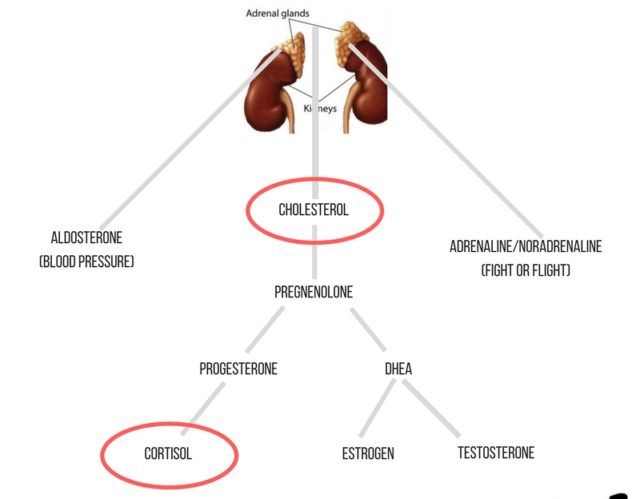This is Part 2 in a three part series, clarifying some of the misunderstandings and confusion in the functional medicine world when it comes to female hormones and the Ketogenic approach to eating (including Intermittent Fasting). This is what held me back a few years ago, so I want to help prevent anyone dealing with hormonal imbalances to feel like they’re doing something “wrong” by adopting a ketogenic/fasting lifestyle, because it’s such a game changer!
In Part 1, I tackled the thyroid – Hypothyroid Disease specifically – including Hashimoto’s (autoimmune hypothyroid disease).

![]() Today is all about the Adrenals. Those tiny little glands that sit on top of our kidneys that help us regulate our energy, the stress response, as well as our blood pressure.
Today is all about the Adrenals. Those tiny little glands that sit on top of our kidneys that help us regulate our energy, the stress response, as well as our blood pressure.
Remember that as much as modern medicine wants to separate our body into organs, glands and disease states – basically as ‘parts’ with ‘specialists’ that operate with tunnel vision in their area of expertise, everything is forever and always connected.
When we hear of “adrenal fatigue” or experience the outcome of adrenal dysfunction such as fatigue, weight gain, belly fat, cravings, insomnia, pain, digestive upset, immune issues, etc.. it’s not this isolated condition that stems from the adrenal glands. It’s a symptom of an overall imbalance rooted in stress. These stress triggers can be:
Physical, Functional, Environmental, Dietary, Nutrient, Lifestyle, Mental, Emotional, Spiritual, etc..
OK – so back to Keto, Intermittent Fasting and adrenal (or stress) balance. Just like the thyroid myths, there are also myths when it comes to the adrenals, Keto and IF perpetuated by several functional medicine doctors and the blogosphere that simply aren’t true The thinking is that:
1. Transitioning to Keto is a stress + 2. Intermittent Fasting is a stress = 3. Keto and IF are not appropriate for adrenal dysfunction.
And this is how the black and white/on and off/all or nothing thinking perpetuates without considering the bigger, more complex picture.
I agree, that someone with stage 4/5 – extreme adrenal exhaustion (where you can’t function – as in nearing adrenal failure), probably needs to focus on healing and not fiddle with the diet. And I also believe that the approach to Keto and IF needs to be strategized in the beginning transition stages to minimize the perceived stress by the body. But for most of us who have hovered in the earlier stages of adrenal dysfunction, the benefits of both Keto and Intermittent Fasting can actually support the adrenals and overall hormonal balance in a really positive way. Here’s how:
- Keto is anti-inflammatory. By reducing inflammation in the body with a real food ketogenic approach, the physical and functional stress of inflammation is reduced which lessens the burden on the adrenals.
- Keto and Fasting give the digestive system more of rest because you usually are eating less frequently (2 or 3 times/day versus 5 or 6). In adrenal fatigue, the increase in cortisol production lowers stomach acid, digestive enzyme production and bile flow which creates more leaky gut, inflammation, more nutrient deficiencies, immune reactivity and weakens detoxification in the body – which adds to the overall stress burden.
- Stablized blood sugar is key. Hyperinsulinemia or Increased insulin production (with too many carbs and/or too much cortisol), weakens pancreatic function which effects digestion, increases insulin resistance and contributes to metabolic diseases like obesity and diabetes. The argument that the thyroid needs glucose/insulin to convert has been debunked in Part 1 – the body makes it’s own glucose and we get plenty from non-starchy veggies and nuts.
- Poor adrenal function weakens thyroid function. High cortisol (which is catabolic – meaning it breaks things down) blocks T3 by increasing Reverse T3 which is inactive and hogs active thyroid receptors in the cells. The adrenals also produce much of our DHEA – an anabolic anti-aging hormone – that’s needed to efficiently allow T3 into the cells. So we go back to that whole connection that stress has on the adrenals which connects to the pancreas (blood sugar and digestion) and the thyroid (the master of metabolism) which ultimately effects our sex hormones – especially in the menopause transition which I’ll cover in the next post.
So, what’s the best way to approach adrenal health when you’re considering or practicing a Keto/Fasting lifestyle? Here are my suggestions:
- Go slow – Just like the thyroid suggestions, it’s important to not create stress in the body. If you’re new to Keto and Fasting start cutting your carbs and eating hours in gradual increments – don’t just go from 100+ grams of carbs and 10 hours of fasting to 20 grams and 20 hours! That’s too stressful to the body. Ease into it. There’s no rush.
- Eat enough anti-inflammatory, blood sugar balancing foods with plenty of healthy fats – We’re wired for survival which means having enough food. Purposefully or unintentionally slashing calories and fat will likely send a stress signal and backfire on most. Listen to your body. It will give you signs when you need to eat more, eat earlier or avoid/have more of certain foods or ingredients. You just have to pay attention and nourish your body with what it’s calling for. For me, that’s Keto with Intermittent Fasting – hands down. It may be culturally “normal” to eat carbs all day-everyday, but it’s ancestrally and physiologically unnatural to do so for most of the population – particularly for those with metabolic or hormonal imbalances.
- Prioritize rest and sleep – My theory is that we evolved to sleep restoratively every night following the light/dark cycles and circadian rhythms of the planet. The only thing that would interrupt sleep back in the day would be a threat. Threats = stress. In our modern world, we tend to be hypervigilent – everything is a potential threat and we lose sleep over things that are not actual threats to our survival, but the stress response doesn’t know the difference. We also need to balance vigorous exercise with more rest and restorative exercise. Using the same ancestral lens, if we were pushing our bodies every day in the wild for hours (topped with endless mental stress), that would signal a survival threat too. Movement needs to be balanced.
- Let Sh*t Go – I learned through years of energy healing/yoga teacher training that the body stores emotional energy – good or bad – until it’s released. This is problematic when we hang on to or tolerate negative energy in our lives (sadness, resentment, anger, fear, trauma). This energy can morph into disease or excess weight, symptoms and patterns – you name it. It needs to be discharged and transformed. You can do this with exercise/movement, body work, reading, meditation, nature, pets, prayer, intention, therapy, talking, touch, writing, creating – whatever speaks to you. Hanging on to or masking these negative energies is a major stress in the body (and probably the hardest thing to identify and change.)
- Work with a practitioner on cortisol/hormone testing and, as you work on all the diet and lifestyle shifts, consider taking some adrenal support. This is my favorite formula. Do not take adrenal glandulars or exogenous hormones (like DHEA supplements) without testing though. Start with adrenal nutrients like the B vitamins, Vitamin C and adaptogenic herbs like Ashwaganda or Rhodiola, etc..and go from there.
The next article will tie the sex hormones together into this hormonal balance puzzle. Stay tuned and post your experience or questions below…xo, Ev




